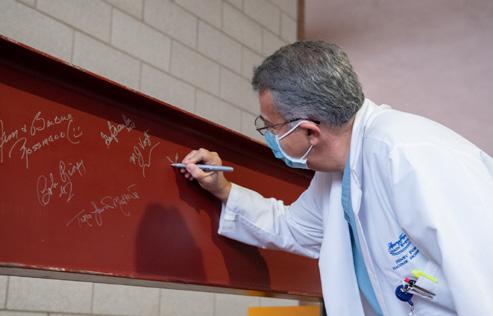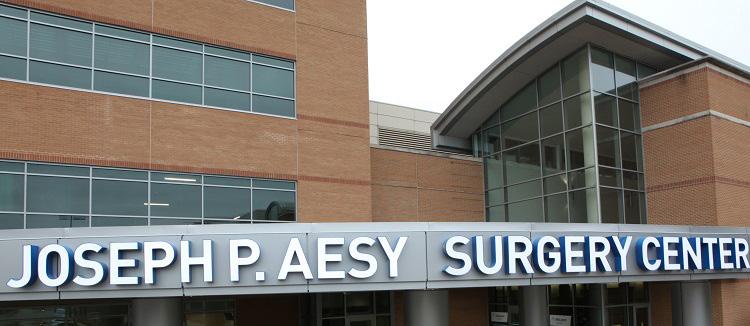
10 minute read
Hospital News
Henry Ford Macomb Hospital
Advertisement
In late October, Henry Ford Health System began unveiling custom art pieces reflecting and celebrating the diversity of its team members and their unique experiences through the COVID-19 pandemic. This project, made possible through Henry Ford’s COVID-19 Relief Fund, is part of the health system’s ongoing efforts and initiatives to provide direct emotional support for team members.
“As an organization we understand that art is synonymous with healing,” said Henry Ford Health System President & CEO Wright Lassiter III. “A healing arts journey like this frankly represents fuel. Fuel that should uplift our souls and feed us when we’re feeling down. Art transforms, art inspires, and art uplifts.” Throughout the creation process, artists have engaged with Henry Ford team members to understand what they have endured both personally and professionally through the pandemic. Their collective experiences are infused into the resulting work. “The artwork will be prominently displayed as an ongoing tribute to our teams and their dedication, resiliency, compassion and perseverance in overcoming this truly difficult time in our history,” said Megan Winkel, Lindsay Anderson Healing Arts Curator and manager of the Healing Arts Program at Henry Ford Cancer Institute. The artists were chosen by committees of team members at each of the 10 Henry Ford Health System locations where the art will be installed. The selected artist for Henry Ford Macomb Hospital is Sue Majewski.
Artist Sue Majewski in her home studio

Henry Ford Macomb Hospital received an “A” Leapfrog Hospital Safety Grade for fall 2021. This national distinction recognizes Henry Ford Macomb Hospital’s achievements in protecting patients from harm and error in the hospital. The Leapfrog Group, an independent national watchdog organization, assigns an “A,” “B,” “C,” “D,” or “F” grade to general hospitals across the country based on over thirty national performance measures reflecting errors, injuries, accidents and infections, as well as systems hospitals have in place to prevent harm.
The Leapfrog Hospital Safety Grade is the only hospital ratings program based exclusively on hospital prevention of medical errors and harms to patients. The grading system is peerreviewed, fully transparent and free to the public. Grades are updated twice annually, in the fall and spring. This is the seventh consecutive “A” rating for Henry Ford Macomb Hospital.
BEAM SIGNING CEREMONY MARKS MILESTONE ON MAJOR EXPANSION AT HENRY FORD MACOMB HOSPITAL
Hundreds of staff members, physicians and community leaders made their mark on the future of healthcare when they signed one of the final steel beams that will be used in the construction of Henry Ford Macomb Hospital’s new north tower. The beam will be raised into place on January 5, 2022 as part of the new tower entrance.
“We are proud to celebrate another milestone in this historic expansion project,” said Barbara Rossmann, president and CEO of Henry Ford Macomb Hospital. “Our progress since our June groundbreaking event is remarkable. The fact that we remain on target for a spring 2023 opening is a testament to our partners and team members.”
Henry Ford Macomb, part of the Henry Ford Health System, is undergoing the largest expansion and renovation in its history with a new five-story, 225,000-square-foot addition featuring 160 private patient rooms that can be converted to manage critically ill patients on par with an Intensive Care Unit. Inpatient units in the existing hospital will also be renovated to create spacious private rooms. Once completed, the project will transform the hospital campus for years to come as the county’s first hospital to provide all 361 of its licensed beds as private rooms for the safety and convenience of patients. The $318 million expansion and renovation represent the largest healthcare investment in the county’s history by a health system. “The pandemic has challenged all of us in many ways,” said Rossmann. “While we work to care for record numbers of patients, both COVID related and those needing tertiary level care – we live with hope in the building being constructed, and in the support of our community.”
Construction on the expansion is expected to be completed in 2023, with renovation of existing patient rooms complete in 2024. Barton Malow/Dixon is the construction firm and AECOM is managing the architectural and engineering design. The hospital will remain fully operational throughout the expansion and renovation. For full details on the project, visit
www.HenryFord.com/
MacombTransformation.
Top: Barbara and Jim Rossmann, Middle: MJ Vogt and Tina Lavinio Mattinen, Bottom: Dr. Samer Kazziha



HENRY FORD HEALTH SYSTEM PARTNERS WITH DTE ENERGY TO REDUCE GREENHOUSE GAS EMISSIONS, IMPROVE IMPACT ON ENVIRONMENT
Henry Ford Health System announced a new partnership with DTE Energy that will dramatically reduce its greenhouse gas emissions in the next decade, help combat pollution and climate change, and help reverse environmental inequities in Detroit. Through DTE’s voluntary renewable energy program, MIGreenPower, Henry Ford will begin purchasing wind and solar energy. The goal is that beginning in 2023, 10% (approximately 19,100 megawatt hours) of Henry Ford’s total electricity purchased from DTE will come from Michigan-made renewable energy, increasing incrementally to 100% by 2029. “Sustainability is an integral part of building strong, healthy communities,” said Bob Riney, Henry Ford Health System’s President of Healthcare Operations and Chief Operations Officer. “At Henry Ford, health equity is at the foundation of everything we do. It’s an unfortunate fact that low-income communities and communities of color are disproportionately impacted by poor environmental conditions, which are exacerbated by climate change. By investing in clean, renewable energy and sustainable infrastructure, we aim to address health disparities and the growing impacts of climate change region-wide, especially in our historically marginalized communities.”
Henry Ford’s clean energy commitment with DTE will begin as soon as the energy company’s infrastructure comes online, likely in late 2023. The initial purchase will reduce the organization’s greenhouse gas emissions by roughly 13,536 metric tons, the equivalent of removing 2,944 passenger vehicles from the road each year.* The system has been working with DTE and other partners to implement other energy conservation measures, like lighting replacement and HVAC upgrades, that are yielding significant reductions in greenhouse gas emission. Henry Ford is also working with other utility providers to identify further energy savings opportunities, including renewable energy options. “We are doing this because we are deeply committed to the health of our communities and dedicated to sustainable solutions that improve health and wellness,” said Chip Amoe, Henry Ford’s Director of System Sustainability. “All of our sustainability initiatives are designed to have a direct impact on improving the health of the employees, patients and communities we serve.”
*Avoided emissions and equivalencies are based on eGrid 2019 marginal non-baseload emissions factors by subregion and the Environmental Protection Agency equivalencies calculator at http://www.epa.gov/energy/greenhouse-gas-equivalenciescalculator

McLaren Macomb Hospital
RENAMED MCLAREN MACOMB SURGERY CENTER RECOGNIZES FAMILY OF LOCAL BUSINESS LEADER
McLaren Macomb has announced that the surgery center located on the hospital’s main Mount Clemens campus will be officially known as the Joseph P. Aesy Surgery Center. The dedication and sign unveiling on October 27 follows a generous donation to the hospital by local business leader Jim George in honor and remembrance of his late father-in-law and the grandfather to his children. George has been associated with the hospital for more than 20 years, beginning as a significant financial donor before joining the hospital’s board of directors in 2000. He was named chairman in 2015.
He joined the board at the system level of McLaren Health Care in 2011, and he was appointed board secretary in 2019. “I’m very proud to support McLaren Macomb in a significant way given its importance to the community,” George said. “We are very fortunate to have this world-class facility providing health care to local residents close to home.” The $3 million donation to support the construction and naming of the surgery center is the latest in his continuing dedication to McLaren Macomb and its mission to provide world-class health care to the Macomb County community. “Jim George’s dedication, leadership and support of our organization has thoroughly solidified his spot as a significant piece of our hospital’s history,” said Tom Brisse, president and CEO of
McLaren Macomb. “His and his family’s continuing support of the community’s health care, and also choosing to dedicate the surgery center in honor of his father-in-law speaks highly to the family’s collective character.” Opened in 2005 following two years of construction, the two-story surgery center at McLaren Macomb represented a 151,000-square-foot expansion of the hospital, the most significant project in the hospital’s history at that time, adding leading edge surgical technology across ten operating rooms (among several more exam rooms) capable of accommodating a range of procedures performed by the hospital’s staff of surgeons.

KARMANOS CANCER INSTITUTE RECEIVES MULTIMILLION DOLLAR GRANT TO DETERMINE WHY ADVANCED CANCER TREATMENT FAILS AFRICAN AMERICANS
Research will examine racial disparities in effectiveness of immunotherapy The Barbara Ann Karmanos Cancer Institute and Wayne State University recently received a $2,997,215 federal grant to help determine why African Americans show poorer responses than whites when treated with one of the most advanced immunotherapies for lung cancer. The specific focus of the grant is to study immune checkpoint inhibitor (ICI) treatment for metastatic non-small cell lung cancer. The grant is through the NCI’s SPORE, or Specialized Program of Research Excellence, which funds collaborative, interdisciplinary translational cancer research. It will fund two projects under the title Reducing Cancer Health Disparities in Detroit.
Project 1: Characterizing race-specific immune profiles with respect to the tumor environment and host genetic back ground to determine their contribution to response to ICIs
Project 2: Understanding racial differences in patients’ responses to ICI treatment The projects will be led by principal investigators Ann Schwartz, PhD, MPH, Deputy Center Director, Karmanos Cancer Institute and Professor and Associate Chair of Oncology, Wayne State University School of Medicine and Gerold Bepler, MD, PhD, Thoracic Oncologist, President and CEO of Karmanos Cancer Institute.
Recent breakthroughs in immunotherapy, particularly ICIs with Food and Drug Administration approval, have offered significant advancements for lung cancer treatment. Unfortunately, African American patients have accounted for less than four percent of ICI clinical trial representation. In the limited data available, African Americans show poorer responses to ICIs than whites, contributing to racial disparities in cancer treatment. Overall, African Americans continue to have worse outcomes after a lung cancer diagnosis than whites, and there are known differences between African Americans and whites in many aspects of cancer treatment, including time to initiation and dose of chemotherapy, symptom burden and treatment of side effects.

Poorer response to treatment and worse outcomes are compounded because lung and bronchus cancers were leading sites of cancer diagnosis among African American men and women from 2019 to 2021, according to the American Cancer Society. Lung and bronchus cancers were the number two cause of cancer death in African American people, following prostate cancer in men and breast cancer in women. Work funded by the grant will provide the basis to move toward a more race-inclusive, equity-focused, precision medicine approach to the use of ICIs and serve as a model for future research on other cancer sites and new agents. “With this grant, we will work to address racial disparities in Metropolitan Detroit, a uniquely important underserved population where great cancer disparities exist,” said Ann Schwartz, PhD, MPH, one of two principal investigators for the study. “Racial disparities in cancer outcomes will likely widen without a comprehensive understanding of the biologic mechanisms driving treatment response in diverse populations and the applicability of clinical guidelines to all populations.” In their efforts to understand racial treatment-response differences, researchers will directly evaluate sociodemographic, individual and disease-specific predictors of response to ICI treatment in African American and white patients. While ICIs hold promise for improved outcomes, little is known about whether potential predictors of patient-reported side effects and quality of life and immune-related adverse events vary by race.
By identifying drivers of potential disparities, health care professionals can better identify patients at high risk for side effects and immune-related adverse events, which are a significant concern. Health care providers can also develop interventions to reduce risk factors, thereby improving patients’ quality of life and reducing racial disparities in outcomes. Unfortunately, little is known about potential racial differences in response to ICI treatment. This is largely due to a lack of inclusion of African American patients in the clinical trials leading to FDA approvals. Thus, there is a critical need to explore whether African American and white patients are affected differently by side effects related to ICI treatment. F



